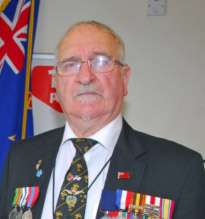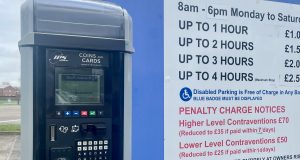Tributes have been paid to a South Holland campaigner who battled for veterans involved in military atomic tests in the 1950s and 60s to be recognised and compensated.
Douglas Hern, of Moulton, was the driving force behind the British Nuclear Test Veterans’ Association and its fight for compensation.
He has died at the age of 86 and never lived to receive the medal he battled for nuclear test veterans to get; more than 60 years after they were exposed to radiation.
Along with his wife Sandie, who died last year, Douglas campaigned for not only a medal, but financial compensation for service personnel involved in the testing.
Sir John Hayes, MP for South Holland and the Deepings, paid tribute to Doug and all his work.
“Doug was a great friend and he was the one who inspired me to get involved with the campaign. Working with him we were able to get the medals and the then chancellor George Osborn approved large amounts of money. It’s not the end of the story. Doug made a big difference to me, and also to the country by getting legislation changed. I was so sorry to hear of his death and my condolences go to his family,” he said.
Some 22,000 servicemen participated in nuclear tests and clean-ups between 1952-1965. Douglas blamed the death of his 13-year-old daughter Gill, in 1977, on the testing as she died from a rare form of cancer.
He was exposed to massive levels of radiation when sent to Christmas Island in 1957 at the age of just 21. He sat on a beach and watched while a nuclear bomb was exploded 19 miles away.
Many service personnel suffered ill health as a result, and Douglas helped create the British Nuclear Test Veterans’ Association.
Poignantly the Cabinet Office finally approved a medal to be awarded to veterans in July and it should be ready ahead of this year’s Remembrance Day events in November. It recognises civilians and military veterans.
The design of the new medal features an atom surrounded by olive branches and the obverse has an effigy of King Charles.
“As thousands flock to the cinemas to watch Oppenheimer, it’s important to remember the contributions of the veterans, scientists and staff who worked on Britain’s nuclear programme,” said the Minister for Veterans’ Affairs Johnny Mercer.
Eligible veterans, civilians and their next of kin can now submit an application to the MoD Medal Office.
Douglas was at the forefront of the fight to prove that illnesses experienced by veterans and their families were caused by the exposure.
He experienced witnessing five nuclear bombs during his time with the Royal Navy. For some of the tests he and his colleagues wore just shorts and flip flops.
When he returned home, Douglas developed a range of medical problems, including the growth of bone spurs from his ribs into his chest.
Musculoskeletal problems are a common issue with veterans.
“Nuclear detonations, that was the defining point of my life,” said Douglas.
“When the flash hit you, you could see the x rays of your hands through your closed eyes. Then the heat hit you, and that was as if someone my size had caught fire and walked through me.
“To say it was frightening is an understatement. I think it shocked us into silence.”
He leaves children Allyson, Tarnya and Kevin along with four grandchildren and two great-grandchildren.
His funeral is due to be held on Wednesday, September 27 with full details to follow.
 The Voice of Spalding and South Holland
The Voice of Spalding and South Holland




